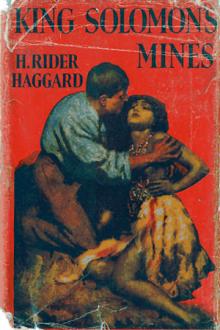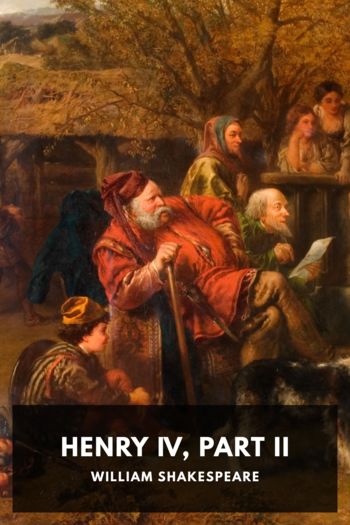King Solomon’s Mines, H. Rider Haggard [best mystery novels of all time TXT] 📗

- Author: H. Rider Haggard
Book online «King Solomon’s Mines, H. Rider Haggard [best mystery novels of all time TXT] 📗». Author H. Rider Haggard
“I am grateful, Bougwan,” was Umbopa’s answer, when I had translated, “and I shall not forget. As for Infadoos, he will be here by-and-by. We must wait.”
So we lit our pipes and waited.
XI We Give a SignFor a long while—two hours, I should think—we sat there in silence, being too overwhelmed by the recollection of the horrors we had seen to talk. At last, just as we were thinking of turning in—for the night drew nigh to dawn—we heard a sound of steps. Then came the challenge of a sentry posted at the kraal gate, which apparently was answered, though not in an audible tone, for the steps still advanced; and in another second Infadoos had entered the hut, followed by some half-dozen stately-looking chiefs.
“My lords,” he said, “I have come according to my word. My lords and Ignosi, rightful king of the Kukuanas, I have brought with me these men,” pointing to the row of chiefs, “who are great men among us, having each one of them the command of three thousand soldiers, that live but to do their bidding, under the king’s. I have told them of what I have seen, and what my ears have heard. Now let them also behold the sacred snake around thee, and hear thy story, Ignosi, that they may say whether or no they will make cause with thee against Twala the king.”
By way of answer Ignosi again stripped off his girdle, and exhibited the snake tattooed about him. Each chief in turn drew near and examined the sign by the dim light of the lamp, and without saying a word passed on to the other side.
Then Ignosi resumed his moocha, and addressing them, repeated the history he had detailed in the morning.
“Now ye have heard, chiefs,” said Infadoos, when he had done, “what say ye: will ye stand by this man and help him to his father’s throne, or will ye not? The land cries out against Twala, and the blood of the people flows like the waters in spring. Ye have seen tonight. Two other chiefs there were with whom I had it in my mind to speak, and where are they now? The hyaena howl over their corpses. Soon shall ye be as they are if ye strike not. Choose then, my brothers.”
The eldest of the six men, a short, thickset warrior, with white hair, stepped forward a pace and answered—
“Thy words are true, Infadoos; the land cries out. My own brother is among those who died tonight; but this is a great matter, and the thing is hard to believe. How know we that if we lift our spears it may not be for a thief and a liar? It is a great matter, I say, of which none can see the end. For of this be sure, blood will flow in rivers before the deed is done; many will still cleave to the king, for men worship the sun that still shines bright in the heavens, rather than that which has not risen. These white men from the Stars, their magic is great, and Ignosi is under the cover of their wing. If he be indeed the rightful king, let them give us a sign, and let the people have a sign, that all may see. So shall men cleave to us, knowing of a truth that the white man’s magic is with them.”
“Ye have the sign of the snake,” I answered.
“My lord, it is not enough. The snake may have been placed there since the man’s childhood. Show us a sign, and it will suffice. But we will not move without a sign.”
The others gave a decided assent, and I turned in perplexity to Sir Henry and Good, and explained the situation.
“I think that I have it,” said Good exultingly; “ask them to give us a moment to think.”
I did so, and the chiefs withdrew. So soon as they had gone Good went to the little box where he kept his medicines, unlocked it, and took out a notebook, in the flyleaves of which was an almanac. “Now look here, you fellows, isn’t tomorrow the 4th of June?” he said.
We had kept a careful note of the days, so were able to answer that it was.
“Very good; then here we have it—‘4 June, total eclipse of the moon commences at 8:15 Greenwich time, visible in Teneriffe—South Africa, etc.’ There’s a sign for you. Tell them we will darken the moon tomorrow night.”
The idea was a splendid one; indeed, the only weak spot about it was a fear lest Good’s almanac might be incorrect. If we made a false prophecy on such a subject, our prestige would be gone forever, and so would Ignosi’s chance of the throne of the Kukuanas.
“Suppose that the almanac is wrong,” suggested Sir Henry to Good, who was busily employed in working out something on a blank page of the book.
“I see no reason to suppose anything of the sort,” was his answer. “Eclipses always come up to time; at least that is my experience of them, and it especially states that this one will be visible in South Africa. I have worked out the reckonings as well as I can, without knowing our exact position; and I make out that the eclipse should begin here about ten o’clock tomorrow night, and last till half-past twelve. For an hour and a half or so there should be almost total darkness.”
“Well,” said Sir Henry, “I suppose we had better risk it.”
I acquiesced, though doubtfully, for eclipses are queer cattle to deal with—it might be a cloudy night, for instance, or our dates might be wrong—and sent Umbopa to summon the chiefs back. Presently they came, and I addressed them thus—
“Great men of the Kukuanas, and thou, Infadoos, listen. We love not to show our powers, for to do so is to





Comments (0)